Archive for August, 2022
Living in Sevilla
- Architecture M.Sc.
- Spain, Sevilla
- Vázquez Consuegra
- April 2022 – July 2022
My internship in Spain was very spontaneous. I applied right before the six weeks deadline and when the Erasmus confirmation came I had only three weeks left to find a flat, book a flight and insurances. I thought that would be an impossible task and almost didn’t try at all. Looking back, I am so happy that I did try! Because everything worked out just fine just as it usually does and after the slightly exhausting organization I had some of the best months so far.
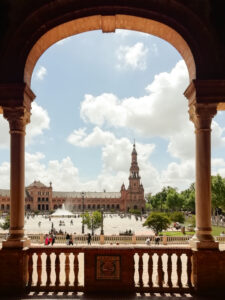
© Smilla Schäfer
Before going to Sevilla, I had this expectation of the Spanish people to be as openhearted and extroverted as I knew it from the South Americans. I was a little shocked to find this to be not very true, at least in my experience. It definitely took some time to figure the people out and make genuine connections and I am very grateful that I had this time!
Where I found this expectation to be true was in my Mexican flatmate. She made the first weeks so much easier for me and I found a great friend in her. During the weekends we would go for trips around Sevilla, for example to Granada, Cadiz Lagos, and during the week for Tapas and Tinto de Verano in the evenings. I am very happy to have met her and cannot wait to visit her in Mexico next year! So, I recommend to not get a flat alone but with flatmates because that is a great way to meet other people that don’t work in the same office.
In the architecture office, in which I did my internship, I met some great people too. The other interns were mainly from Italy and especially with one of them I became good friends. Once a week we would go to our favourite bar, Galeria Taberna Anima, together with my flatmate where they played Flamenco Music every Wednesday. Highly recommend that. Another intern was from Croatia and one week a few friends of hers came with one of her professors from Slovenia to visit her and our office.
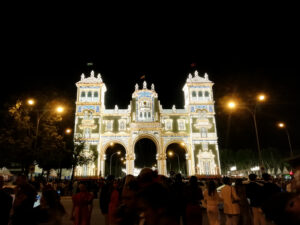
© Smilla Schäfer
This was a very happy coincidence because I connected well with them and now will start my next internship in their office in a few weeks.
So, the thing I am most grateful for are definitely the people I met and the connections I made during this internship!
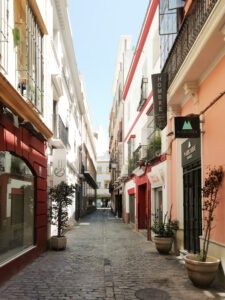
© Smilla Schäfer
But besides that, I also fell in love with Andalucia and Sevilla itself. The landscape with its mountains and beaches is stunning and the culture so rich that there seems to be a different fiesta or feria every other week. I loved to live by this new rhythm – work in the morning, siesta in the evening and going out at night -, I loved the food and how they put olive oil on everything and I even loved the climate, although I am not going to lie, the late July with 46 degrees every day was hard. If you go to Sevilla, make sure your apartment has airconditioning!
Because of the heat the office had a special summer schedule. We would start at 8am and leave the office at 3pm. An exception was the time right before a submission deadline, when everybody had to stay longer but in general everybody left really punctual. Non-negotiable was the coffee break at 11am. The office had no coffee machine, so we left the office to go to the next bar in small groups every day. Very quickly the Coffee and Tostada con Aceite y Tomate became a daily ritual for me and I already miss that.
In conclusion I can say that this internship abroad contributed highly to my professional growth as an architect and allowed me to network with a lot of interesting people but also helped a lot to my personal growth and gave me many great experiences! I recommend taking this chance and just doing it to everyone who might be thinking about it.
My experiences in Bristol
- Electrical Engineering, Information Technology and Computer Engineering (M.Sc.)
- United Kingdom, Bristol
- Infineon Technologies U.K. Ltd.
- March 2022 – August 2022
I lived in Bristol for five months as part of the UNITECH programme. The programme aims to connect engineering students with each other and with companies and to promote the development of soft skills. Part of the programme is a semester abroad at one of the participating universities in Europe and an internship at one of the companies. I decided to do an internship at Infineon Technologies UK Ltd., which at the same time covered the industrial internship I had planned in my Master’s programme.
Through the UNITECH programme, I already had direct contact with Infineon’s HR department, which meant that there was no need for a traditional application process. I wanted to do the internship in a non-German-speaking European country and work on both technical and non-technical tasks. Therefore, a position in the sales area in Bristol was suggested to me, which I accepted after a discussion with my future supervisor.
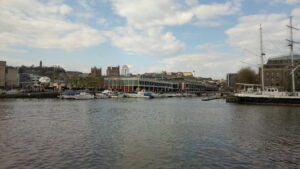
© Maike van den Berg
I was paid like a graduate student for the internship, which in my eyes was a high salary for an intern by German standards, but not necessarily for young professionals. The funding of the internship as an Erasmus+ internship was especially helpful when applying for a visa.
Because of the Brexit, I needed a visa to be able to work in the UK. The process – as mentioned above – was greatly simplified by the Erasmus funding. I applied for a Tier 5 visa with the help of the RWTH. I had to apply for a Certificate of Sponsorship from the British Council, with the RWTH as the sending institution and the company as the receiving/host institution. With this Certificate of Sponsorship, I was then able to apply for the visa online.
I found a room in a shared house in Bristol through SpareRoom, which is similar to WG Gesucht. Living in Bristol is very expensive and I was lucky to find something affordable close to the city centre. Right at the beginning I bought a British prepaid card (ASDA Mobile) so that I could then open a bank account. It was all done online and I went to Lloyds Bank.
My experience in Bristol can be divided very well into professional and private.
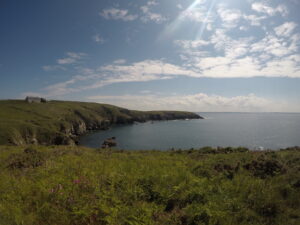
© Maike van den Berg
The internship didn’t really live up to my expectations, partly due to the fact that my supervisor left the company a few weeks after the start of the internship and there was no real replacement, and partly due to the office culture at Infineon in Bristol. Due to the restructuring following the termination of my supervisor, I often lacked a direct contact person and received little feedback on my work despite repeated requests. This was depressing, especially because I had no experience in the sales field and was therefore often somewhat disoriented. However, the internship also included technical projects, which I enjoyed much more and which made me feel more comfortable in the team. In addition, there was little active social life in my office and most of my colleagues were much older than me. Even though I had consistently good experiences in direct contact, no real personal relationships were formed.
These rather disillusioning experiences were more than made up for by everything outside of work! Through my housemates, I had a lot of contact with people my own age locally. Unfortunately, I wasn’t allowed to join any societies at the university because I would have had to be a local student, but I did find a basketball team and made friends through it.
I found Bristol to be a great place to live. It’s a very progressive city with a great arts and culture scene and lots of concerts, some of which are free. There is an almost endless choice of vegan restaurants and many local ciders and beers. The harbour in the city adds to the atmosphere and there are many beautiful parks for warm summer evenings (I was very lucky with the weather during my time there!). Also, the proximity to Wales offers many opportunities for beautiful hikes in the hilly countryside. Unfortunately, the national parks there are not so easy to reach by public transport, so we often rented a car privately via Karshare.
Compared to Germany, the UK is more expensive in all areas. The cost of living was quite high and I found public transport especially expensive.
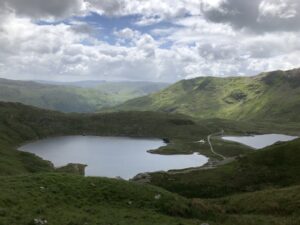
© Maike van den Berg
That’s why I bought a bicycle right at the beginning, which saved me a lot of expensive bus rides.
I am more than happy that I was able to do the internship in Bristol! The internship itself probably helped me the most in that I now know what is important to me in a future job and how I would (not) like to work. At the same time, of course, the insight into a large company was also interesting, as it gave me the opportunity to work with a wide variety of people at Infineon’s different locations.
Everything aside from the internship was what particularly enriched my time in Bristol. I found the British people I met to be incredibly friendly and open and I felt like I was living in a city where many things are possible.
Helsinki – A truly livable, diverse and exciting city
- Materials Engineering, PhD
- Helsinki, Finland
- Aalto University
- April 2022 – July 2022
At the end of 2021, I have decided to spend three months on a research stay at Aalto University in the Finnish capital. Finland has attracted me for quite some time. It appealed to me to learn how people live in the northern countries of Europe, how the much-praised education and social system works, and what it’s like to live with 20 hours of sunshine a day. The opportunity for the research stay came about through a long-term collaboration with Aalto University.
I found out more about Helsinki through former student colleagues and friends. They suggested me to apply for a room in one of the many student dormitories. Everyone recommended the student agency HOAS. Through HOAS I got a cheap room in a 6-person shared flat. Only exchange students that studied in Helsinki for a semester were accommodated in my apartment building. This meant that we always spent a lot of time together. Whether it was going to the sauna, having dinner together or kayaking in the early evening, there was always something going on. However, it takes much more effort to get in closer contact with Finnish people than with internationals. Therefore, I joined a soccer club at the beginning of my stay and thus came into exchange with the locals. It is also possible to meet the locals in everyday university life, but you should be aware that building a friendship is not as easy as in other cultures. Nevertheless, you can learn a lot from the Finns. I found it impressive with which composure things were accepted and how pragmatically solutions were found. Moreover, I had the feeling that Helsinki is a city for all people. A very good public transport network, a developed bicycle path system, clean barbecue areas and public saunas. In addition, the low crime rate makes Helsinki a very livable city.
In particular, the public library Oodi, where, in addition to the possibility of borrowing books, there are also offers for young children, video games, workstations, sound studios, 3D printers and much more. A place for young and old; rich, and poor. A place for exchange across social classes and age boundaries. Very impressive!
From Helsinki you can also visit the Estonian capital Tallinn. The crossing by boat takes just 2.5 hours and costs less than 10 euros per trip. There you can see the influence of the European Union: Neighborhoods are being modernized, digitalization is being pushed hard, infrastructure is being expanded. For me, the contrast between the old Soviet structures and the influence of European ideas was very exciting to observe. While older people spoke Russian and Estonian in the markets of the Estonian capital, English was clearly heard more often among the younger generation. Young people wanted to belong to the EU and be a part of the idea of a common Europe.
Finns like distance and in this case, it has nothing to do with the pandemic, but it is a good habit not to get too close. There is one exception, however: the sauna. In saunas, Finns are very talkative, moving close together to make room for everyone. It’s a place for socializing and sharing, and I’ve spent a few evenings there with colleagues, roommates, and new friends.
In summary, I can say that the Finnish capital is truly livable, diverse, and exciting. I am glad and grateful to have been given this opportunity for a research stay. Finally, my personal advices for staying in Helsinki as a student: live in HOAS dormitory, buy HSL-City Bike subscription (35 euros for 6 months), visit the beach on Pihlajasaari, go kayaking, go to Tallinn, eat cheap sushi, spend time in Oodi, discuss with Finns in the sauna, spend long summer nights at public barbecue places, drink cheap beer in Kallio district and try Finnish salmon soup.
Writing a Master Thesis in Milan
- Management and Engineering in Technology, Innovation, Marketing and
Entrepreneurship M.Sc. - Italy, Milan
- Politecnico di Milano
- March – June 2022
I am happy to share some insights on my time abroad in Milan, Italy. During that time, I conducted research on my Master thesis at Politecnico di Milano. I am solely responsible for the content of this report.
Preparation
Prior to applying for the Erasmus+ Internship grant, there are several steps to be taken independently from the country or city you will be studying at. In my case, didn’t do an internship but wrote my Master thesis at a foreign university. Therefore, preparation included looking for interesting institutes or researchers across Europe, who have expertise in a specific field you are interested in writing a thesis in. A decent approach is to search for relating papers or studies, for example. After you have set eyes on a specific institute, I suggest writing a short research proposal. This includes 5-10 pages where you are explaining your motivation and your expertise regarding the specific research topic. Additionally, I suggest you write a short introduction to a possible topic that seems suitable as Bachelor/ Master thesis. Once you are in contact with respective researchers at the institute you applied for, you can start looking for an internal supervisor at RWTH. The overall topic of the thesis can then be “finetuned” between the three parties. From my expertise (I also wrote my Bachelor thesis externally), it shouldn’t be a big problem to find an internal supervisor as long as the external institution seems interesting! The actual application for the Erasmus grant is quite self-explanatory and convenient, so no need to further explain it in this report.
There is not much to consider before moving to Milan, as it quite easy to move around the European Union. However, when living in Italy you need to register for an Italian tax number. Just contact the Consulate of Italy in Cologne before the movement and they will send you a respective number.
Living in Milan
Everyone who has been to Italy before, knows exactly the Italian kind of vibe. And even though Milan is in the northern part of Italy, the so-called business part, you can truly feel this Italian spirit in Milan. Enjoy the food and all the Aperitivos you will have during your time abroad! Milan truly offers a lot of great restaurants, bars, and cafes. But don’t fall into the tourist trap and rely too heavily on websites like TripAdvisor and Co. Rather try out Pizzeria Assaje for an amazing pizza! Because by doing so, it can easily get quite expensive without the food actually being delicious. Thus, I suggest walking around the streets and absorbing the atmosphere. I am quite certain that you will quickly find a great place to eat. Especially, the district Citta Studi where the PoliMi is located offers great localities. But the great part about Milan is its great variety of districts that all offer other specialties. Navigli, for example, is famous for its many bars and the two canals that are filled with tourists during the day. In contrast, Porta Venezia is known as gay district and also offers great bars including a lot of clubs, whereas Moscova is rather a more expensive area where the wordl famous Duomo is also located. Other than that, almost every day you can find a lot of people gathering on public places. The infamous, Piazza Leonardo right in the center of PoliMi offers a great atmosphere with hundreds of students gathering every weekend and some DJs playing some music. Milan as the creative and fashion capital of Italy offers lots of intellectual places. Fondazione di Prada or Pinacoteca di Brera displays great art and amazing architecture. Many museums offer student discounts. Pinacoteca di Brera, for example, just costs 2€ per person.
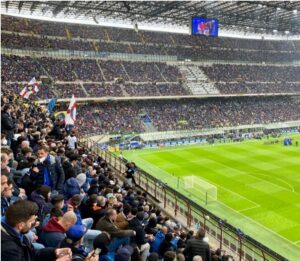
Picture from the stands of the San Siro stadium (Inter Milan vs AS Roma) © Jason Grüninger
Other than that, the San Siro stadium accommodates both Milanese teams AC Milan as well as Inter Milan. So, plenty of possibilities of embracing the incredible atmosphere in this stadium while watching first class football.
In summer, Italians are usually driving to the seaside themselves. You should do the same because Milan is quite empty in August! On a side note, as you are not included in any official welcome days by the host university, I suggest writing the RWTH authorities and asking them to share your contact details with the other moving students from RWTH. In this way, you already get to know some people before going abroad and can discuss common difficulties.
Accommodation/ Transport
For accommodation I recommend using Housing Anywhere. In Italy it is common that you don’t get to know your flat mates before you haven’t actually rent a room in the respective apartment. In my opinion that quite weird, but it is what it is. Just don’t be surprised! Another surprise can come with the prices for flats in the central districts. However, I suggest embracing the opportunity and really getting the most out of your time abroad by staying in the cool districts like Citta Studi, Porta Venezia, Washington, Moscova, Navigli. Otherwise, you might have to drive quite long distances, specifically because the metro stops working after 1pm and you have to use buses instead. Regarding the transportation, get yourself a monthly metro ticket. You just need a picture and then can file for the ticket at one of the ATM offices in the metro stations. The ticket costs 22€ per month and also allows you to take buses. Riding a bike in Milan is no fun because of cobblestones, bad streets, etc., so better use the public transport. Safety is not an issue in the public transport. Just be careful when taking the night buses, but no more caution is needed than anywhere else in big European cities.
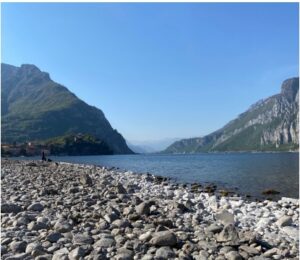
Lago di Como pictured in Lecco © Jason Grüninger
Around Milan
Milan is located in a great region. You are close to the mountains, as well as close to Lago di Como, Lago di Maggiore, and Lago di Garda. Enjoy some sun and take a dip at these destinations, it’s just an hour away from Milan by train!
Lecco, for example, is easy to reach and offers a cute little town at the stunning beginning of Lago di Como. I also went to Venice for two days, which is also quite close (3 hours by train).
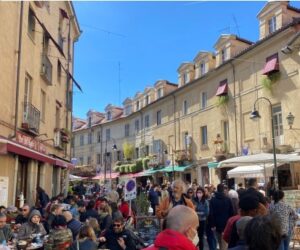
Busy street on a sunny day in Turin © Jason Grüninger
Additionally, Turin is close by and is definitely worth a visit! An absolutely underrated visit is the city of Bergamo. Especially the old town of Bergamo is beautiful and definitely worth a visit.
I hope this report gives you a good first impression of your time abroad.
I wish you a wonderful time in Milan!

